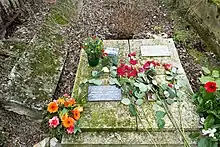Pouran Bazargan
Pourandokht "Pouran" Bazargan (Persian: پوراندخت (پوران) بازرگان) was an Iranian teacher, revolutionary and translator. She was notably the first female member of the People's Mojahedin Organization of Iran (MEK).
Pouran Bazargan | |
|---|---|
.png.webp) | |
| Born | Pourandokht Bazargan 1937 |
| Died | 6 March 2007 (aged 69–70) |
| Nationality | Iranian |
| Political party |
|
| Spouse |
Mohammad Hanifnejad
(m. 1968; died 1972) |
Biography

Bazargan was born in a middle-class family in the city of Mashhad and was brought up as a devout Muslim.[1] As an adult she became principal of Refah School, a girls school in Tehran.[1] Bazargan joined the MEK as the first woman ever, and married Mohammad Hanifnejad, a co-founder of the group.[1] Bazargan was a regular of Ali Shariati speeches at Hosseiniyeh Ershad and personally in touch with him.[2][3] According to Ali Rahnema, Shariaiti who knew that Bazargan was associated with the MEK, introduced Simin Jariri to her.[3] Bazargan left Iran after the blow to the MEK and resided in a number of countries, including Syria, Lebanon and Turkey, to act as a liaison for the group.[4] In 1974, she married fellow MEK member Torab Haghshenas.[4] In 1975, she sided with the Marxist faction of the MEK.[1] Among her family members in the MEK, only her sister converted to Marxism while her brother Mansour Bazargan and sister-in-law Fatemeh Amini remained Muslims and associates of the Islamic faction.[1]
After the Iranian Revolution, Bazargan became a member of the communist Organization of Struggle for the Emancipation of the Working Class[1] and continued her political activity in exile.[4] Despite her status as the widow of the MEK's martyr and co-founder, as well as being the first woman in the group, she became a critic of the MEK.[5] In 1985, Bazargan openly opposed marriage of MEK leader Massoud Rajavi and Maryam Qajar-Azodanlu, describing it as "an insult" to the memory of the early MEK leaders and comparing Rajavi with the Shah.[5] She also denounced subsequent events in the group as part of its "ideological revolution", stating that "the divorce, the abandonment of children, and the marriage to the wife of a close friend was unprecedented in political movements".[5]
In exile, Bazargan translated many works from French, English and Arabic with her husband Torab Haghshenas and launched a website name Peykar Andisheh.[4] The couple espoused a more internationalist view and became critical of armed struggle because they believed guerrilla movements were isolated from the workers' movement.[4]
Bazargan died in 2007.[4]
References
- Abrahamian 1989, p. 147
- Rahnema 1998, p. 278
- Rahnema 1998, p. 318
- Mather 2016
- Abrahamian 1989, p. 253
- Rahnema, Ali (1998), An Islamic Utopian: A Political Biography of Ali Shariati, I.B.Tauris, ISBN 1860645526
- Abrahamian, Ervand (1989), Radical Islam: The Iranian Mojahedin, I.B. Tauris, Yale University Press, ISBN 9781850430773
- Mather, Yassamine (4 February 2016), "Obituary: A lifelong internationalist" (PDF), The Weekly Worker (1092): 11